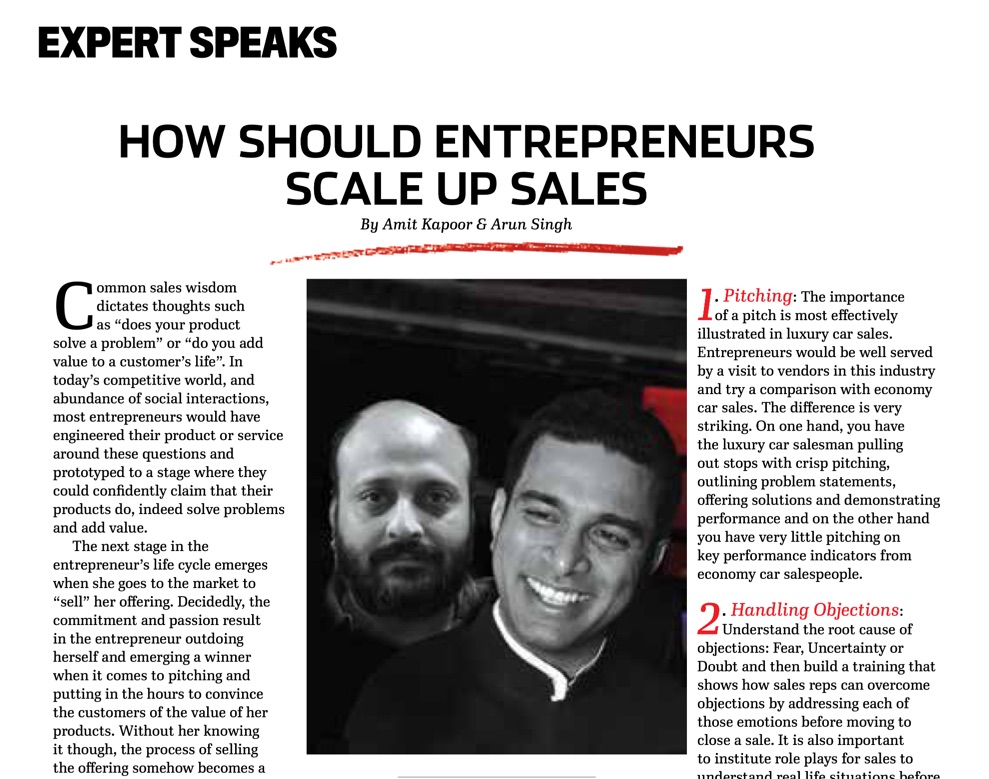Common sales wisdom dictates thoughts such as “does your product solve a problem” or “do you add value to a customer’s life”. In today’s competitive world, and abundance of social interactions, most entrepreneurs would have engineered their product or service around these questions and prototyped to a stage where they could confidently claim that their products do, indeed solve problems and add value.
The next stage in the entrepreneur’s life cycle emerges when she goes to the market to “sell” her offering. Decidedly, the commitment and passion result in the entrepreneur outdoing herself and emerging a winner when it comes to pitching and putting in the hours to convince the customers of the value of her products. Without her knowing it though, the process of selling the offering somehow becomes a unique part of her personality and when the time comes to scale, the message that the entrepreneur wants to transfer to her salespeople becomes lost in translation.
There is a real danger of sales teams following basic sales principles instead of the process that the entrepreneur used to make the service/product a success, as a result, sales execution is not upto the mark and the “magic” the entrepreneur promised investors is missing.
Given that sales growth and sales efficiency, which impact the topline and bottomline are key considerations for investors, the scaling up stage creates considerable pressure on entrepreneurs if the issue of sales excellence is not addressed.
There are some elementary steps that the entrepreneur can follow to ensure that the sales scale up is a smooth process:
Designate the salesperson
Within the set of founders, identify the founder who will lead sales. Two people cannot do the same job and should not do the same job when scaling. If there is a single founder, hire a competent head of sales since other functions will require the founder’s attention.
Hire strong trainers and institute an excellent training program
Training of sales is the most important part of scaling, an often un-utilized feature, especially in field sales. Hiring of the right trainers is an even more important part. Sourcing of trainers should not be a lightly taken decision since the company message when drilled down, if drilled down wrongly will result in disaster. Once trainers have been hired, sales training should focus on a few key aspects to ensure strong field performance.
- Pitching
Focus on specifics. Show how your service/product is different. This is usually done by first outlining the problem statement and then showing how the service/product solves that problem. In most cases, sales reps fail to do so in front on customers and this is mostly due to poor training effort in this direction.
The importance of a pitch is most effectively illustrated in luxury car sales. Entrepreneurs would be well served by a visit to vendors in this industry and try a comparison with economy car sales. The difference is very striking. On one hand, you have the luxury car salesman pulling out stops with crisp pitching, outlining problem statements, offering solutions and demonstrating performance and on the other hand you have very little pitching on key performance indicators from economy car salespeople.
- Handling Objections
Understand the root cause of objections: Fear, Uncertainty or Doubt and then build a training that shows how sales reps can overcome objections by addressing each of those emotions before moving to close a sale. It is also important to institute role plays for sales to understand real life situations before moving into the field. Trainers will need to spend time to assess if the sales reps are “field ready” to ensure that objections from customers are effectively handled and the service/product moves on to a purchase decision.
- Closing Sales
Sales closure is another very important part of the sales cycle, and training effort needs to ensure sales reps understand the techniques used by modern sales industry to ensure the customer finally pays for the service/product. Needless to say, this too requires time to be spent on role plays before the trainer deems the sales rep field ready.
Build a process
The magic needs to be recreated and replicated en masse. The end result needs to look like clones of the entrepreneur herself, as if she were representing the company on the field. The process building begins with the entrepreneur identifying each intervening step from opening a sale to closure in the sales cycle, which also includes delivering the service/product. This process needs to be drawn out and drilled into the minds and hearts of sales reps. Without a process, sales would be weak.
Manage the process
The process once built needs to be managed end to end. Each point in the pipeline should consist of some data collection, which should be analyzed. Ensuring that data collection during a collection of requirements/needs is as important as crafting the perfect pitch and delivering it as per the demands of the situation.
Rinse and repeat
The above steps need to become part of company culture in a continuous loop. This will lead to quicker customer acquisitions as the learnings distill down as a culture to new recruits.
Published with Entrepreneur on June 1, 2016.
























